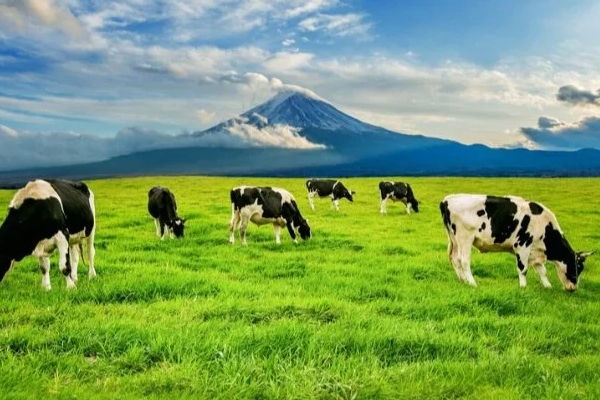In collaboration with the Antalya Agricultural Council (ATAK) and the Antalya Commodity Exchange (ATB), a 'Sustainable Milk Production Panel' was organized as part of World Milk Day events.

A "Sustainable Milk Production Panel" was organized as part of World Milk Day events in collaboration with the Antalya Agricultural Council (ATAK) and the Antalya Commodity Exchange (ATB). The panel, moderated by ATB Press Advisor Vahide Yanık, featured ATB 4th Occupational Committee Chairman Yaşar Kocaoğlu, Antalya Breeders Association of Sheep and Goats President Zeliha Öztürk, Elmalı Milk Producers Association President Ali Gümüşlü, and Veterinary Physicians Association Board Member Fatih Özgür. The panel included milk offerings and discussions on dairy farming, milk consumption, milk prices, costs, and challenges in milk production along with proposed solutions.
Yaşar Kocaoğlu, Chairman of the ATB 4th Occupational Committee, stated that small family farms need to be supported to sustain milk production, one of the basic food sources. He noted the increasing number of families quitting dairy farming recently, saying, "Especially small family farms are being crushed under costs and are withdrawing from farming." Emphasizing the importance of dairy policies, Kocaoğlu said, "If there is no milk, there is no meat."
Kocaoğlu also highlighted the high cost of animal feed, a crucial input in livestock farming, which is often overlooked in discussions about milk prices. "Animal feed is expensive. Why don't we talk about that? We purchase feed based on foreign exchange rates, along with other costs like fuel and energy. If a producer cannot buy 1.5 kilograms of feed with the money earned from 1 liter of milk, it's not sustainable. Currently, we can only buy 1.3 kilograms of feed with 1 liter of milk's price. The National Milk Council set the producer's purchase price at 14.65 TL per liter, but this is not realistic. The cost of 1 liter of milk is 16 TL, and unless the purchase price is 18 TL, producers will incur losses and businesses will continue to close. In the long term, milk will become even more expensive," he said.
Ali Gümüşlü, President of the Elmalı Milk Producers Association, pointed out the decline in milk production. He noted that milk production decreased from 23.2 million tons in 2021 to 21.563 million tons in 2022, a 7% decline, and further to 21.480 million tons in 2023. He highlighted that the number of milking animals dropped from 28.1 million in 2021 to 25.8 million in 2022. With a per capita annual milk consumption of 137.1 liters, Turkey ranks 56th globally, whereas in Europe, the annual per capita milk consumption is 350 liters or more. Gümüşlü emphasized the importance of milk as an animal protein for human health and stressed the need for projects like school milk programs to support both producers and consumers. He warned, "If we continue with these policies, in the coming years, we will see large animals only in zoos and will have to show them to our children there."
Zeliha Öztürk, President of the Antalya Breeders Association of Sheep and Goats, stated that instead of importing animals to close the meat and milk gap, small ruminant farming should be supported. She mentioned the high added value of sheep and goat milk products, saying, "The products we produce never stay in our hands; we have ready customers and can market them at high prices." Highlighting the region's suitability for small ruminant farming, Öztürk said, "Remove the obstacles in front of small ruminant farming, and we will contribute to both meat and milk."
Öztürk also highlighted the difficulty in finding shepherds, stating, "It's hard to find shepherds because living in rural areas is tough. There's no electricity, water, internet, or social life. First, rural infrastructure and social support need to be provided. We live in a primitive manner. Providing caravan living for those engaged in livestock farming in rural areas could help. If farmers were given caravans, it would address their shelter problem and provide energy through solar power," she explained.
Fatih Özgür, Board Member of the Veterinary Physicians Association, emphasized the need to reconsider and reorganize livestock policies from scratch. He pointed out the high number of calf deaths and suggested that if measures were taken to reduce these deaths, there might be no need for meat and animal imports. He called for serious efforts to improve the efficiency and quality of dairy breeds. "This way, we can achieve efficiency and quality in milk production," he said.
Questioning why milk has become so expensive, Özgür noted, "Animals used to graze in nature, but we have destroyed our pastures. We have turned agricultural lands into concrete. We removed goats from forests, thinking they harm the environment. The number of animals has decreased, leading to higher meat and milk prices. We tried to lower prices by importing animals. To save livestock farming, there's no need for extravagant projects. By establishing a system where producers are supported, and the obstacles in agriculture and livestock are removed, family farms can sustain livestock, meat, and milk production. For Turkey to close the meat gap, milk must first become profitable," he concluded.
Following the speeches, the audience asked questions to the guests.